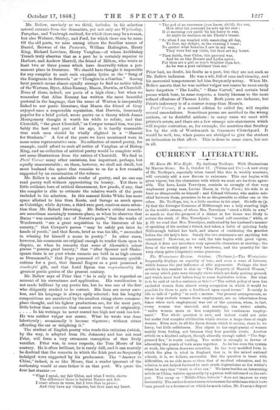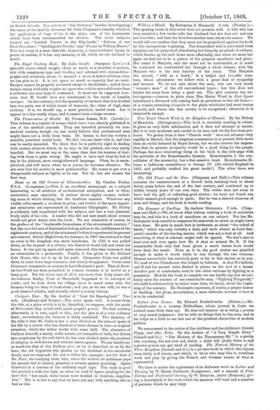The Westminster Review. October. (Triihner.) — The Westminster frequently displays an asperity
of tone, and oven a want of fairness, which lessons the just influence of able arguments. Perhaps the best article in this number is that on "The Property of Married Women," an essay which puts very strongly views which are daily gaining ground, and which must lead before long to some legislative action. But what is to be said of such a sentence as this ?—" Tho selfish policy of men has excluded women from almost every occupation in which it would be possible for them to gain a livelihood upon equal terms." It surely is idle to talk of "policy " in such a matter. Our present arrangements, 80 far as they exclude women from employment, are an inheritance from times when such employment was out of the question, when, in fact, every woman was marlied, and marriage, the writer admits, "unfits women more or loss completely for continuous employ- ment." The whole question is new, and indeed could not arise but under that complex civilization which creates a largo class of single women. Even now, in all the fierce debate which it excites, there is, we fancy, but little selfishness. Men objoct to the employment of women mainly from feeling, not because they fear possible rivals. Another article on a kindred subject, though absurdly enough called " Tho Sup- pressed Sex," is worth reading. The writer is strongly in favour of educating the youth of both sexes together. As he has seen the system at work, his opinion deserves attention. In the very modified form in which the plan is tried in England, that is, in the mixed national schools, it is, we believe, successful. But the question is beset with difficulties, on no side more so than that of medical education, and its solution is not helped forward by such crude dogmatisms as the writer's when he says that "truth is of no sex." We have besides an interesting article on China, written apparently by a person well-informed on the sub- ject. The essay on "Middle-Class Schools" does not impress us very favourably. The au thordoes not seem to have seen the criticisms which have been passed on a document on which he much relies, Mr. Fearon's Report
on Scotch Schools. The article on Sea Sickness," besides investigating the cause of the malady, discusses Dr. John Chapman's remedy, which is the application of bags of ice to the spine, one of the treatments which have been recommended for cholera. The other subjects treated are "Landed Tenure in the Highlands," "Reform of our Civil Procedure," "Spielhagen's Novels," and "Poems by William Morris." This last essay is a most fantastic rhapsody, a transcendental hymn in praise of realism, if it has any meaning at all, which we are inclined to doubt.



































 Previous page
Previous page